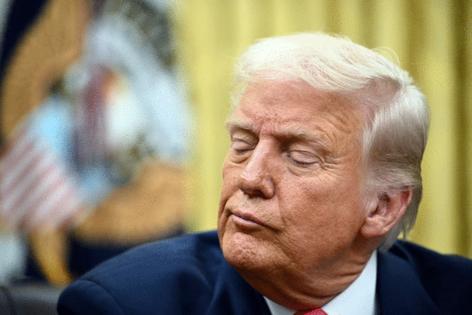Commentary: Trump's policy reversals -- A new way to govern?
Published in Op Eds
“If all else fails, push the start button, look for smoke, and repair what is burning.” During my 15 years working with industry, this was common advice when dealing with troublesome complex electric controls that just would not respond to a more scientific analysis. And it worked. Should we expect a president hellbent on changing the world order to apply the same approach?
Flipping policy switches on and off might not sound scientific, but despite chaos and missteps, there’s at least something to be said for the idea.
Maybe it’s the rush to get things done. Or perhaps it’s the fact that Trump is relying on executive orders rather than on legislation with hearings to mandate much of what he envisions. In any case, the Trump administration is now famous for hitting a policy start button, seeing smoke and then, when alarms go off, reversing position.
How else might we explain the large number of policy reversals that occurred in the president’s first 100 days back in office? Consider a handful of examples.
Just a week into his new term, Trump’s Office of Management and Budget (OMB) issued a freeze order on all federal loans and grants in an effort to make certain that all funded programs would abide by the new administration’s tamped-down Diversity, Equity and Inclusion guidelines. But the outcry from state and local governments that rely on federal funding for day-to-day operations was so loud that OMB quickly reversed its order.
Then, in February, the Trump administration announced an end of free COVID testing, a mainstay program in fighting the pandemic. When the Department of Health and Human Services indicated that the agency would thus be destroying 160 million unused tests, political alarms went off and the policy was reversed.
More famously, after growing impatient with the Federal Reserve Open Market Committee for not cutting interest rates, Trump decided to hit the start button and blow them out of the water. He called the Fed Chair Jerome Powell a “major loser” and indicated he should be fired… immediately.
When world financial markets sensed that America’s central bank was about to be run by politics, interest rates rose, respect for the dollar fell and the end of American economic exceptionalism was posited. Smoke was everywhere. Trump backed away, softened the tone of his relationship with Fed Chair Powell and moved on to tilt with other windmills.
Another tilting occurred when Trump took on China by imposing a 145% tariff on all its exports to the United States, the functional equivalent of an embargo. China responded by laying on 125% tariffs on U.S. exports and indicated a willingness to engage in a trade war or any war that became necessary.
Markets shuddered. American retailers cried foul and indicated Santa Claus’s sled would be empty. Apple and other U.S. smart phone producers offered up end-of-world industry forecasts.
In short, the circuits turned red and the smoke was dense. Trump dramatically altered his policy position. The trade war with China suddenly de-intensified, at least for the next 90 days.
Finally, Elon Musk’s DOGE activities brought its own host of circuit tests that generated smoke and reversals. There were sweeping actions taken to fire thousands of federal government workers only to rush to rehire some when it was learned that they filled critical jobs involving nuclear weapons or controlling a raging bird flu epidemic.
Some look squarely at these policy reversals and see evidence that we have the equivalent of keystone cops running the federal government — officials who don’t seem to know what they are doing, but they do it anyway. Alternatively, and in at least some of these situations, we might consider the old “push the start button and look for smoke” explanation.
In a rush to bring dramatic change, the Trump administration seems to agree with Ralph Waldo Emerson that “consistency is a hobgoblin of small minds.” When things change, they change. Policy reversals are messy, but some might be a necessary part of Trump’s intended revolution.
____
Bruce Yandle is a distinguished adjunct fellow with the Mercatus Center at George Mason University, dean emeritus of the Clemson College of Business and Behavioral Sciences and a former executive director of the Federal Trade Commission.
_____
©2025 Tribune Content Agency, LLC.

























































Comments